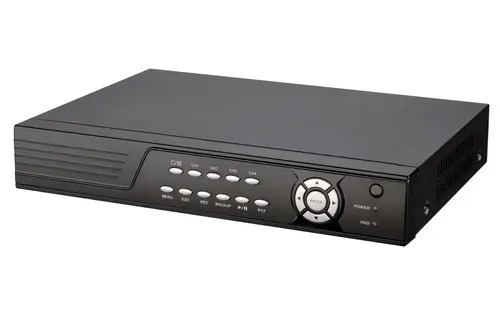
CCTV DVR: Digital Video Recorder
Introduction to CCTV DVR
In today’s world, security is a top priority for both businesses and homeowners. One of the most essential components of any surveillance system is the Digital Video Recorder (DVR). This guide will explore what a CCTV DVR is, how it works, the different types available, and key features to look for when choosing one. Additionally, we will cover installation tips, common issues, expert insights, and future trends in CCTV DVR technology.
What is a CCTV DVR?
A CCTV DVR, or Digital Video Recorder, is a device used to record and store video footage from security cameras. Unlike older systems that relied on tapes, DVRs digitally store footage on hard drives, making it easier to access, search, and manage video recordings.
How Does a CCTV DVR Work?
CCTV DVRs work by converting analog video signals from security cameras into digital format. The DVR then compresses and stores the video data on a hard drive. Users can view live footage or access recorded video through a monitor connected to the DVR or remotely via the internet.
Types of CCTV DVRs
Standalone DVRs
Standalone DVRs are self-contained units designed specifically for video recording. They are typically used in smaller setups where ease of use and reliability are key.
PC-Based DVRs
PC-based DVRs use computer hardware to perform the recording and storage functions. They offer more flexibility and scalability but require more technical knowledge to set up and maintain.
Hybrid DVRs
Hybrid DVRs support both analog and IP (Internet Protocol) cameras, making them ideal for transitioning from older systems to more modern setups.
Key Features to Look for in a CCTV DVR
Resolution and Frame Rate
The resolution and frame rate of the DVR determine the quality and smoothness of the recorded video. Higher resolutions and frame rates provide clearer and more detailed footage.
Storage Capacity
The storage capacity of the DVR is crucial, especially for systems that record 24/7. Look for DVRs with large hard drives or the ability to add external storage.
Remote Viewing Capabilities
Many modern DVRs offer remote viewing through smartphones or computers, allowing users to monitor their property from anywhere in the world.
Motion Detection and Alerts
Motion detection features can help save storage space by only recording when movement is detected. Alerts can also be sent to notify users of potential security breaches.
Compatibility with Cameras
Ensure that the DVR is compatible with the cameras in your surveillance system. Some DVRs only work with specific camera brands or types.
Installation of CCTV DVR Systems
Choosing the Right Location
Place the DVR in a secure and ventilated location. It should be easily accessible for maintenance but hidden from potential intruders.
Wiring and Connections
Proper wiring is essential for a reliable CCTV system. Use high-quality cables and connectors to prevent signal loss and interference.
Configuring the DVR Settings
Once installed, configure the DVR settings according to your needs. This includes setting up recording schedules, motion detection zones, and remote access.
Benefits of Using a CCTV DVR
CCTV DVRs provide several benefits, including enhanced security, easy access to recorded footage, and the ability to monitor multiple cameras simultaneously. They are an essential tool for protecting property and ensuring peace of mind.
Common Issues and Troubleshooting for CCTV DVRs
DVR Not Recording
If the DVR is not recording, check the hard drive for errors, ensure there is enough storage space, and verify that the recording schedule is properly set.
Poor Video Quality
Poor video quality can result from incorrect resolution settings, faulty cables, or outdated cameras. Adjust the settings or replace the necessary components to improve video clarity.
Connectivity Issues
Connectivity issues may arise from network problems, outdated firmware, or incorrect settings. Ensure that the DVR is properly connected to the network and update the firmware if needed.
Expert Insights on Choosing the Right CCTV DVR
Choosing the right CCTV DVR depends on your specific needs and budget. Experts recommend considering factors such as the number of cameras, desired video quality, and the level of technical support available. It’s also advisable to invest in a reputable brand known for reliability and customer service.
Future Trends in CCTV DVR Technology
The future of CCTV DVR technology is moving towards higher resolutions, better integration with smart home systems, and more advanced AI-driven analytics. These trends will enhance the ability to detect and prevent security breaches more effectively.
Practical Tips for Maximizing the Use of Your CCTV DVR
- Regularly update the DVR firmware to benefit from the latest features and security patches.
- Schedule routine maintenance checks to ensure that all components are functioning correctly.
- Use strong passwords for remote access to protect your system from unauthorized access.
Conclusion: The Importance of CCTV DVRs in Security Systems
CCTV DVRs play a vital role in modern security systems by providing reliable and efficient video recording and storage. Whether for a small business or a large commercial property, a well-chosen DVR can significantly enhance security and peace of mind .
FAQs
What is the difference between a DVR and an NVR?
A DVR is used with analog cameras, while an NVR (Network Video Recorder) is designed for IP cameras.
How long can a DVR store video footage?
The storage duration depends on the DVR’s hard drive capacity, the number of cameras, and the recording settings.
Can I upgrade the hard drive in my DVR?
Yes, many DVRs allow for hard drive upgrades to increase storage capacity.
Need a Free Consultant? For Security Solution
Discover top-quality CCTV camera solutions in Dubai with CCTV Camera Dubai. We offer a wide range of surveillance products for residential and commercial security needs. Trust our expertise for cutting-edge technology, expert installation, and unmatched customer support. Enhance your security today.
